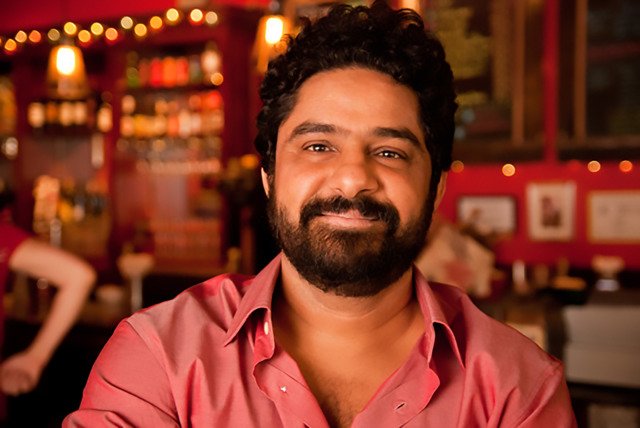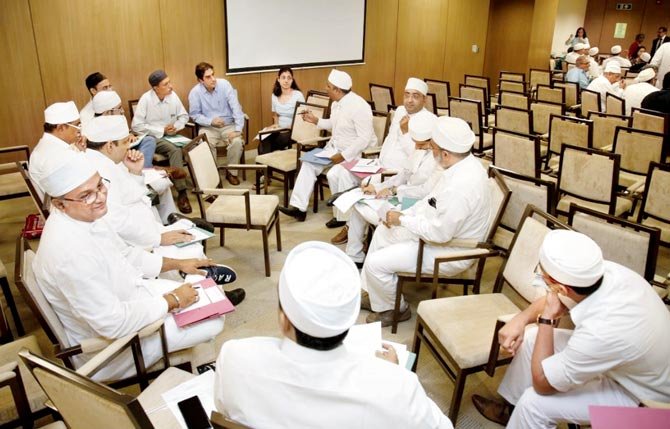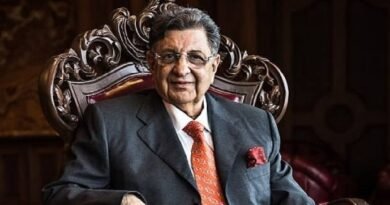Parsi and Jewish culture collide at Challahwalla

“Stop us if you’ve heard this one before. A Parsi and a Jew walk into a restaurant…” So begins the official introduction for the first ever Challahwallah, a six-course, family-style Parsi Jewish dinner scheduled for Thursday, November 10 at Chai Pani Decatur.
The brainchild of Parsi chef Meherwan Irani (Chai Pani, Botiwalla) and Jewish chefs Todd Ginsberg (The General Muir, Fred’s Meat & Bread, Yalla) and Eli Kirshtein (The Luminary), Challahwalla binds two divergent religions — and the cultures that have sprung from them — through the universal language of food with “a mystical, culinary journey … back in time to rediscover the common ingredients that their ancestors cooked with.”
Here, the three Atlanta chefs go deep on culture, history, cooking, and the spirit of community that holds it all together.
Tell me about the moment of this dinner’s inception.
Irani: I’m of course Parsi and grew up in India. My wife Molly is Jewish and when I met her large and extended family, I was struck at the similarities between her culture and mine: deep cultural roots, mostly displaced from another country or part of the world (my ancestors fled religious persecution in Persia — modern day Iran — and immigrated to India), peculiar religious observances, culturally adept at business, and most importantly a love of food, and family coming together over food. So this idea had been germinating in my mind for a while: that given how similar our cultures were and that we originated from the same part of the world, we probably shared some commonalities in our cuisines. When I met Todd and Eli at a party we started comparing notes about our cultures and that’s when the idea for a dinner popped into my head. I approached Todd (and later Eli) and ta-dah!
Ginsberg: I have been eating Persian food my whole life, almost as much as the Eastern European style of Jewish food (what we might think of as deli food) — yet chef Irani was the first to talk to me about the similarities between Parsi and Jewish heritage. My parents had a close friend named Moustafa who introduced us to the foods of his upbringing. To this day whenever my parents come to visit me, we go to Persian food for lunch or dinner at least once. So, this idea that Chef put forward was a real opportunity for me to have some fun with an incredible chef. I credit him for making this happen and I’m grateful for the opportunity.
Kirshtein: When I first heard about the event, Todd and Meherwan were already onboard. After having had a few conversations with both of them in the past about doing a collaboration event, I got connected and there was no way I was turning it down. We have always gravitated towards each other at events for a similar mindset and a very similar self-deprecating sense of humor, so working on event together seemed like a natural evolution of that.
Tell me a little about your own individual cultural backgrounds. How did your heritage affect your upbringing and ultimately, your decision to become a chef?
Irani: Parsis love food. It’s literally integrated into our religious ceremonies. And it’s a very distinct and highly regarded cuisine in India — a mash-up of Arabic, Persian, English and Indian influences. Finding a good Parsi restaurant today is as prized as finding a good Jewish deli. One of the first books that inspired me to become a chef was My Bombay Kitchen by Niloufer Ichaporia King, a James Beard Best Cookbook of the Year, and it’s completely about Parsi cuisine.
 Ginsberg: I like how you phrase the question — while Judaism is a religion, to many, like myself, it’s a culture — and one in which food and the communal “breaking of bread” plays an important role. So, perhaps unconsciously my Jewish heritage led me to become a chef. I only know that I became a chef because I loved to cook and I enjoyed spending my time in restaurants. But, then, I was drawn to open a deli because I grew up with that as my daily comfort food and wanted to apply my skills as a chef to that particular genre of food. I turned up the volume on something that was always there throughout my life, but as background music.
Ginsberg: I like how you phrase the question — while Judaism is a religion, to many, like myself, it’s a culture — and one in which food and the communal “breaking of bread” plays an important role. So, perhaps unconsciously my Jewish heritage led me to become a chef. I only know that I became a chef because I loved to cook and I enjoyed spending my time in restaurants. But, then, I was drawn to open a deli because I grew up with that as my daily comfort food and wanted to apply my skills as a chef to that particular genre of food. I turned up the volume on something that was always there throughout my life, but as background music.
Kirshtein: I was a little unique and that my Jewish identity came later in life. I had grown up with many of the traditional High Holiday practices, but after the passing of my paternal grandmother, much of that went away. I came more into Judaism after a trip to Israel, and began to understand that the importance for me is more of the cultural angle and less of a religious one, knowing that my ancestors practiced these ideas, and that is part and parcel to the food as well. I always do cherish all of the holidays, with the food being such a major component. I have learned to summate Jewish holidays into “they tried to kill us, we got away, let’s eat” and it seems to ring true often!
How does your culture continue to influence your cooking and business practices today?
Irani: My dad is Parsi and mom is Hindu from northern India. Mixing two religions and cultures like that was very unusual in India at the time and still is today. That exposure to two distinct cultures and their cuisines gave me the ability to break out of the mold with Indian food and to see things differently. For example, Hindus are primarily vegetarian and Parsis are world class carnivores, so my mom (mothers are the primary cook in most Indian households) had an amazing, eclectic approach to cooking that constantly broke the rules of either culture’s traditional cuisines.
 Ginsberg: My Jewish heritage has been the single biggest influence in my style of cooking over the past four years. The General Muir is a tribute to the New York delicatessen — originally a Jewish thing, but ultimately a New York thing and an American thing. So the foods that my mom and my grandmothers cooked for me growing up have found their way to the menu. This is the food of my people and their people and was something that was always a part of my life, but only recently a part of my chef-life. With food such an integral part of the Jewish holidays, we have guests who turn to us at the General Muir for their meals for holidays and significant Jewish life events. It has been so interesting to learn the experiences and expectations of different Jewish families when it comes to those foods. Again, those interactions make me think of my own upbringing in a way I didn’t before.
Ginsberg: My Jewish heritage has been the single biggest influence in my style of cooking over the past four years. The General Muir is a tribute to the New York delicatessen — originally a Jewish thing, but ultimately a New York thing and an American thing. So the foods that my mom and my grandmothers cooked for me growing up have found their way to the menu. This is the food of my people and their people and was something that was always a part of my life, but only recently a part of my chef-life. With food such an integral part of the Jewish holidays, we have guests who turn to us at the General Muir for their meals for holidays and significant Jewish life events. It has been so interesting to learn the experiences and expectations of different Jewish families when it comes to those foods. Again, those interactions make me think of my own upbringing in a way I didn’t before.
Kirshtein: I find much inspiration in the foods of both western Judaism as well as of the Levant. While there is a blend of the two, there are some fairly distinct differences on more broad strokes. Simple things, like spice blends and open fire roasting from the Middle East as well as cured meats and fish from closer to home, are always inspirational. I have realized in recent years that the many aspects are spread across my life organically when it comes to the food, whether it be my wife making shakshuka for dinner or krantz cake turning into a staple for most holiday spreads in my home, it is notably ubiquitous.
Have the three of you ever worked together before?
Irani: We’d met socially at various food related events and I was always drawn to hang out with Eli and Todd since I was fascinated with their Jewish heritage and how that affected their travels, stories and approach to food. I’m pretty sure after Challahwalla we’ll all know each other perhaps a little too well!
Ginsberg: I have admired Chef Irani for a long time, but did not know him well. Chai Pani is one of the places that I love to go to no matter what the circumstance might be. Kids? Check. Date? Check. Great dinner? Check. Interested in trying something new? Check. It’s a very special place. So when Chef asked me to join in this dinner I jumped at the chance to do it with him. Collaborating with other chefs is always an amazing opportunity for personal growth. (May I take this opportunity to plug another upcoming collaboration, hosted at the General Muir?) This particular collaboration, however, because of its theme and its celebration of similarities and differences, takes that personal growth to another level and extends it to the guests.
Kirshtein: I have spent time with Meherwan at events several times and we have gotten to know each other a good bit — we have cooked side by side a few times and always had a blast. Todd is like an older brother and we have even joked about dressing up as each other for Halloween before, so you could say we know each other pretty well.
What are your goals in hosting this dinner? What do you hope to teach your guests?
Irani: That food is ever-changing and is meant to adapt to its environment. There’s sometimes a little too much emphasis on traditional or authentic cuisine especially when it comes to ethnic foods. To “Americanize” something is a foodie four letter word. What I hope to show people is that all food, even “traditional” food, is still on a journey. The journey started a long time ago when most humans lived pretty close together in a couple of pockets around the world and it’s perfectly okay for even traditional Jewish and Parsi food to continue to evolve — look how far those two rivers that came from a common source have already diverged.
Ginsberg: I know I’m going to have fun and learn about the Parsi culture and, in doing so, learn more about my own culture. Through food of different cultures and events like these, chefs and restaurateurs have an opportunity to show guests that we — Atlantans, Americans, humans — are more similar than we realize and more different than we realize — and it’s all good. Isn’t that what this country was built on?
Kirshtein: I want to be part of a continuing dialogue about these two cuisines that I find so fascinating. The realization that these two have culinary roots, so similarly placed, is exciting in and of itself. When you look at the relation of the two cultures from the antiquities to present, you see so many relatable roads that are deeply inspiring. I want to show off these foods to a group of people, with a similar mindset to myself, who are excited and driven towards these two cultures and their cuisines. I additionally and personally want to learn more myself, and I know that will happen, because whenever I find myself in food conversations with Meherwan and Todd, I am constantly inspired and enlightened.
How does the city of Atlanta help facilitate cultural collaboration? Why is this the right place for a dinner like this?
Irani: For a city the size of Atlanta, it’s remarkable how close the community of chefs is — that all know each other and love to work with each other. That makes putting together events like this easy — sometimes just by bumping together at an event and letting the creative juices flow. And for a southern city, Atlanta is also remarkably adventurous, culinarily speaking. Its large, ethnically diverse population produces some great restaurants and food, so I’d put our taste buds and palate up against any world-class city.
Ginsberg: I think Chef said it best.
Kirshtein: Atlanta is an incredibly diverse, open minded and educated clientele. It has a unique ability to embrace and get excited about things with a little more esoteric tinge, a little more off the beaten path. Fortunately, this is a great opportunity to show off a few things that aren’t out there every day to an excited group of guests.
Challahwalla – A Parsi Jewish Dinner. $75. 7-10 p.m. Thurs., Nov. 10. Chai Pani Decatur. 406 West Ponce de Leon Ave., Decatur. Tickets here.





